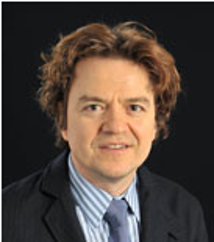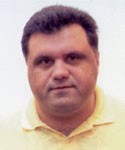Plenary Speakers |

Yiannis Papadopoulos
Department of Computer Science
University of Hull
United Kingdom
|

Thomas Moor
Lehrstuhl für Regelungstechnik
Friedrich-Alexander-Universität Erlangen-Nürnberg
Germany
|

Spyros Reveliotis
School of Industrial & Systems Engineering
Georgia Institute of Technology
USA
|
PLENARY TALKS
|
Title:
|
Real-Time Management of Complex Resource Allocation Systems: Necessity, Achievements and Further Challenges DOWNLOAD SLIDES
|
|
Speaker:
|
Spyros Reveliotis, Georgia Institute of Technology, USA.
|
|
Synopsis:
|
Many contemporary applications, ranging from flexibly automated production
systems, to automated material handling and intelligent transportation systems, to internet-based workflow management systems, and more recently, to the massively parallelized software systems that emerge in the context of the novel multi-core computing architectures, can be perceived as a set of finite resources that support a number of concurrently running processes; these processes execute in a staged manner and vie for the allocation of various subsets of the system resources. To effectively support and manage the extensive levels of concurrency and operational flexibility that are contemplated for these environments, and the ensuing complexity, there is a substantial need for Formal models and tools that will enable the modelling, analysis and eventually the control of aforementioned resource allocation function so that the resulting dynamics are, both, behaviourally correct and operationally efficient.
This talk will overview a research program that seeks to address the aforementioned need by using the unifying abstraction of the resource allocation system (RAS) and supporting modelling frameworks, like automata, Petri nets, and Markov reward and decision processes, borrowed from the area of Discrete Event Systems (DES) theory. The presented results take advantage of the special structure that exists in the considered RAS classes, and are further characterized by, both, their analytical rigor and computational tractability. The talk will also highlight the further challenges that must be addressed for the successful completion of the pursued theoretical framework.
|
|
Biography:
|
Spyros Reveliotis is a Professor in the School of Industrial & Systems Engineering, at the Georgia Institute of Technology. He holds a Diploma in Electrical Engineering from the National Technical University of Athens, Greece, an M.Sc. degree in Computer Systems Engineering from Northeastern University, Boston, and a Ph.D. degree in Industrial Engineering from the University of Illinois at Urbana Champaign. His primary research interests are in the area of Discrete Event Systems theory and its applications.
Prof. Reveliotis is an IEEE Fellow and a member of INFORMS. He has served on the Editorial Board of various journals, including the IEEE Trans. on Automatic Control, the IEEE Trans. on Robotics and Automation, the IEEE Trans. on Automation Science and Engineering, the Journal of Discrete Event Dynamic Systems, the IIE Transactions, and he has also been a Senior Editor in the Conference Editorial Board for the IEEE Intl. Conference on Robotics & Automation. In 2009 he was the Program Chair for the IEEE Conference on Automation Science and Engineering, and currently he serves as a member of the Steering Committee for this conference. Dr. Reveliotis has been the recipient of a number of awards, including the 1998 IEEE Intl. Conf. on Robotics & Automation Kayamori Best Paper Award.
|
|
|
Title:
|
Intersections of Philosophy, Logic and Biology in Design DOWNLOAD SLIDES
|
|
Speaker:
|
Yiannis Papadopoulos, University of Hull, United Kingdom.
|
|
Synopsis:
|
Professor Papadopoulos will discuss the way in which ideas of philosophy, logic and biology have influenced research on the design of complex engineering systems. In particular, he will focus on his own work in a method for analysis and design of dependable systems that has achieved wide academic recognition and technology transfer to several industries. He will then show that the same principles can be applied to the design of new dynamic and evolutionary art forms. The lecture will conclude with a computer-aided art show where a vast audio-visual design space that contains quintillions of possible configurations of a musical painting will be explored, and where original art will be produced with the aid of a computer.
|
|
Biography:
|
Yiannis Papadopoulos is Professor of Computer Science and leader of the Dependable Systems (DS) Group in the University of Hull. He has studied Engineering and Computer Science in the Aristotelian University of Thessaloniki and the University of Cranfield and holds a PhD in Computer Science from the University of York. Over the last twenty years Professor Papadopoulos has pioneered a body of work on model-based dependability analysis and evolutionary optimisation of complex engineering systems known as Hierarchically Performed Hazard Origin and Propagation Studies (HiP-HOPS), and has co-authored EAST-ADL an emerging Architecture Description Language (ADL) developed as standard by the automotive industry. These technologies have gained wide academic recognition and have been successfully transferred to several industries, where they have been commercialised and successfully deployed in organisations which include Volvo, Toyota, Honda, Fiat, Continental, Germanischer Lloyd and Embraer. Within IFAC, Professor Papadopoulos is actively involved in TC 1.3 on Discrete Event and Hybrid Systems and TC 5.1 on Manufacturing Plant Control. He represents TC 1.3 in the International Programme Committee of the SAFEPROCESS Symposium, and he is a member of the Steering Committee of DCDS - the Workshop on Dependable Control of Discrete Systems which provides the key event on dependability research within IFAC. He co-chaired the 4th edition of DCDS that took place in York, in the United Kingdom, in 2013.
|
|
|
Title:
|
Fault-Tolerant Supervisory Control DOWNLOAD SLIDES
|
|
Speaker:
|
Thomas Moor, Lehrstuhl für Regelungstechnik, Friedrich-Alexander-Universität Erlangen-Nürnberg, Germany.
|
|
Synopsis:
|
A system is fault tolerant if it remains functional after the occurrence of a fault. Given a plant subject to a fault, fault-tolerant control requires the controller to form a fault tolerant closed-loop system. For the systematic design of a fault-tolerant controller, typical input data consists of the plant dynamics including the effect of the faults under consideration and a formal performance requirement with a possible allowance for degraded performance after the fault. For its obvious practical relevance, the synthesis of fault-tolerant controllers has received extensive attention in the literature, however, with a particular focus on continuous-variable systems.
This presentation provides an overview on fault tolerance within the framework of supervisory control to address plants that are represented by regular languages or, equivalently, by finite state machines. The discussion will include results that adopt concepts known from the continuous domain, but it will also demonstrate fundamental differences and highlight challenges particular to discrete-event systems.
|
|
Biography:
|
Thomas Moor received his PhD degree (Dr.-Ing.) in 1999 from the University of the Federal Armed Forces Hamburg. From 2000 until 2003 he was a research fellow with the Research School of Information Sciences and Engineering at the Australian National University. Since 2003, he holds a professorship at the Lehrstuhl für Regelungstechnik, Friedrich-Alexander-Universität Erlangen-Nürnberg, Germany. His research interests include the control of discrete-event systems and hybrid systems, hierarchical and/or modular control systems, control system abstraction and fault-tolerant control. He serves on the Editorial Board of the Journal of Discrete Event Dynamic Systems and co-chaired the Workshop on Discrete Event Systems when it took place in Berlin 2010. He is maintainer and principle developer of the discrete-event systems software library libFAUDES, with a particular focus on supervisory control in an industrial application context.
|
|
|
|
|
|

